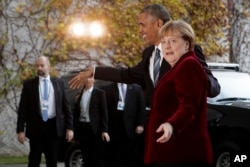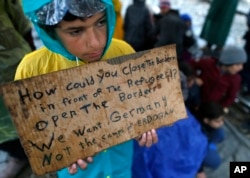President Barack Obama joined the leaders of major European countries in Germany Friday to discuss security and economic challenges facing the trans-Atlantic partners.
The session with the leaders of Germany, Britain, France, Italy and Spain expands on lengthy talks he held a day earlier with Chancellor Angela Merkel.
In what is likely the last such gathering before he leaves office in January and President-elect Donald Trump moves into the White House, Obama brought his message of America’s enduring unity and cooperation to the heart of Europe Thursday, stressing to Germans and all Europeans that the United States will continue to engage with the world.
Obama called on his successor, Donald Trump, to “stand up” to Russia, saying his hope is that the president-elect takes a “similarly constructive approach” as he did, “finding areas where we can co-operate with Russia where our values and interests collide.” "I don't expect the president-elect will follow exactly our approach, but my hope is that he does not simply take a realpolitik approach and suggest if we cut some deals with Russia, even if it hurts people or violates international norms or leaves smaller countries vulnerable or leaves long-term problems in regions like Syria, that we do what's convenient at the time," Obama said during a news conference with Merkel in Berlin.
The U.S. leader chose Germany as the main stop of his final overseas tour as president. The country is Europe’s top economy and U.S. trading partner, an important member of NATO and host to thousands of U.S. troops.
Observers have also suggested Merkel could be emerging as the most prominent liberal voice in a region where nationalist movements are gaining strength.
This last trip marks President Obama’s sixth visit to Germany.
“There will be no return to a world before globalization,” Obama and Merkel wrote in a joint editorial published in the German business weekly WirtschaftsWoche, before the U.S. leader’s arrival.
Obama’s message was meant to reassure European leaders who are nervous about what some perceive as America’s turn toward isolationism as reflected in remarks made by President-elect Trump during his campaign.
Trump called into question the relevance of NATO, praised Britain’s decision to quit the European Union, and criticized Merkel’s policy of admitting hundreds of thousands of migrants, most of them Muslims, into Europe. During his campaign, Trump referred to Merkel as “a great world leader,” but said her decisions on immigration issues were “tragic” and a “catastrophe.”
Analysts say Merkel’s calls for migrant quotas among EU nations have fueled nationalist movements across Europe, including Germany, and were a key factor in British voters’ June decision to leave the European Union.
Far-right populist movements have also made gains in Germany following the migrant crisis, and Merkel’s party has suffered losses, including in her home state.
She is now weighing whether to run for a fourth term as chancellor.
The outgoing U.S. president will be heading to Peru for the Asia Pacific Economic Cooperation summit later Friday.













